Trump raked in big money from foreign nations. Experts fear he'd do it more if re-elected
- Oops!Something went wrong.Please try again later.
- Oops!Something went wrong.Please try again later.
- Oops!Something went wrong.Please try again later.
WASHINGTON – If former President Donald Trump wins a second term in November, his personal and family business interests could pose even bigger ethical problems and national security risks than they did during his first term − when he exploited the presidency to financially benefit himself in unprecedented ways, ethics experts warn.
Trump earned up to $160 million in total from businesses in foreign countries while he was in office, according to one recent estimate from the Washington watchdog group Citizens for Responsibility and Ethics in Washington (CREW). That estimate included income from at least 69 foreign trademarks granted to Trump businesses and 150 foreign officials who visited a Trump business.
Millions of those dollars flowed to the Trump Organization from corrupt and authoritarian governments such as China, Saudi Arabia, and the United Arab Emirates, according to a January report from Democrats on the House Committee on Oversight and Accountability.
“We have to assume that not only would we see what we saw in the four years of his presidency, but that we'd see it a lot more and probably done a lot more brazenly,” said CREW president Noah Bookbinder.
And given recent court judgements declaring that Trump owes more than $530 million in damages, Bookbinder said, “He's got a real need for it now.”
Trump's family also fared well under his administration, including his daughter Ivanka and son-in-law Jared Kushner, whom Trump appointed as senior White House advisors even as they kept ownership of at least some of their private business operations.
A vast and Byzantine global empire
Trump has built a global business empire that includes current and proposed real estate properties, licensing deals and other investments in many countries.
During his 2016 campaign, Trump broke with precedent and did not release his tax returns, making it more difficult for the public to assess the extent and nature of his foreign entanglements.
Ethics experts also said Trump's putting his assets in a "blind trust" run by his children did little to eliminate conflicts of interest because he did not divest himself of his holdings while dealing with the leaders of those countries.
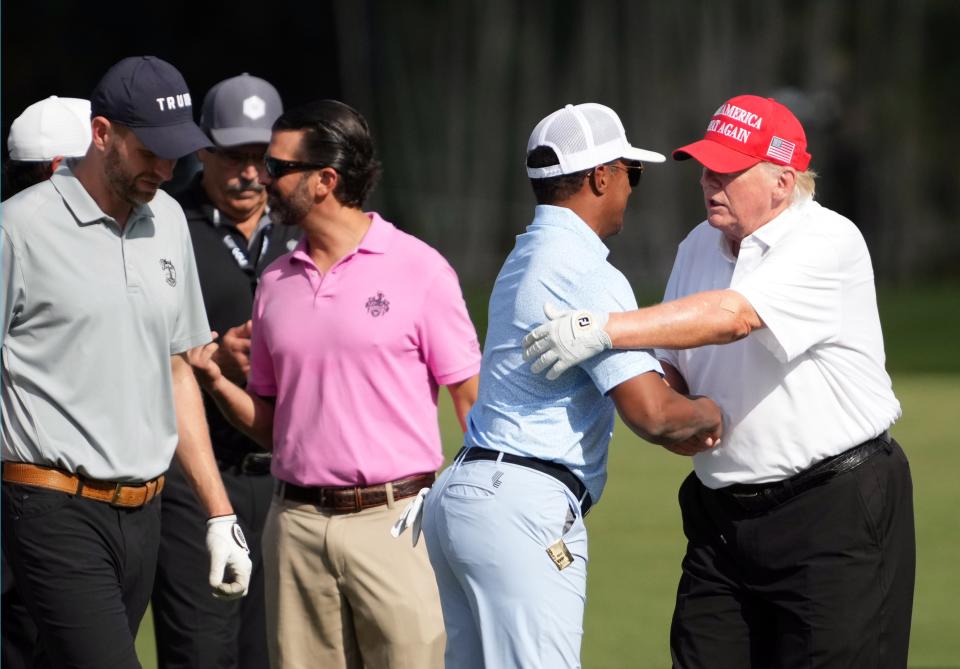
Most concerns stemmed from Trump’s alleged violations of the emoluments clause, an anti-bribery provision in the Constitution that prohibits any U.S. officeholder from accepting “any present, Emolument, Office, or Title, of any kind whatever, from any King, Prince, or foreign State” without the consent of Congress. It’s derived from the Latin word “emolumentum,” meaning “profit” or “gain.”
Some legal experts say Trump's foreign income and ongoing foreign business interests violated that clause when he was in the White House. “The Founders, recognized such payments as a grave threat," Richard Painter, the chief White House ethics lawyer for President George W. Bush, a Republican, told USA TODAY.
Others contend that it may not apply to Trump because the provision does not specifically identify the president as subject to it. "As the head of the executive branch, the president may not be able to — and arguably under the Constitution it might not be possible to require the president to — recuse from government decisions," Richard Briffault, a professor at Columbia Law School, told Politifact.
In Trump’s first term, a steady parade of foreign government officials spent millions renting rooms and space at Trump properties such as Trump's golf courses and his Trump International Hotels in Washington, D.C. and Las Vegas, often at exorbitant prices.
Since 2018, the Trump Organization has sent payments of undisclosed amounts to the U.S. Treasury, which it says are equal to the profits from foreign government spending Trump properties. Democratic lawmakers and ethics watchdogs such as CREW and the Center for American Progress (CAP) say that doesn't eliminate the conflict of interest because knowing foreign officials stay at Trump properties could still influence him.
Trump 'worked to be legally compliant'
Trump campaign spokesman Steven Cheung told USA TODAY that Trump "divested and worked to be legally compliant during the first term. It would be safe to assume he will follow all rules and regulations" if re-elected.
Cheung also said Trump "entered into an ethics pledge that held him to a higher standard and more than what was required."
The Trump Organization did not respond to multiple requests for comment.
Getting 'aligned with authoritarian leaders'
Gail Helt, a former CIA analyst, expressed concern about Trump’s relationships with authoritarian leaders like Russian President Vladimir Putin, supreme leader of North Korea Kim Jong Un, and Egyptian President Abdel Fattah el-Sisi.
While campaigning in 2015 and 2016, Trump was still pursuing real estate deals in Russia even as he publicly supported Putin and welcomed Russian interference in the presidential election on his behalf. Once in office, he took Putin's word over the findings of U.S. intelligence agencies that concluded that the Kremlin had tried to help him win the White House.
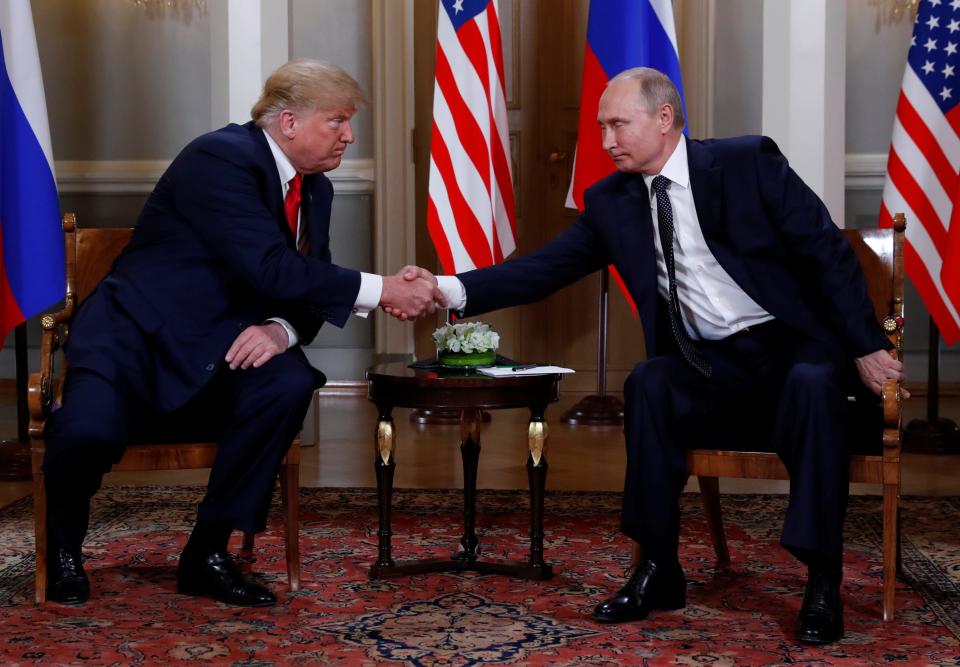
Trump also told journalist Bob Woodward that he protected Saudi Arabia from consequences for its murder of the U.S.-Saudi journalist and critic Jamal Khashoggi and blessed a $110 billion sale of U.S. weapons to Riyadh.
“Trump has consistently shown himself to be aligned with authoritarian leaders in countries that are hostile to American interests,” Helt said. “Given his legal woes and financial difficulties, it is not hard to imagine him leveraging national security information, refusing to support a NATO mission, or even pushing deregulation that favors foreign business interests in return for cash infusions into Trumpworld.”
'The monetization of diplomacy'
Ivanka Trump made significant profits profits from her namesake clothing, jewelry, accessories and other businesses worldwide, according to financial disclosure filings and watchdog groups. She also obtained the government of China’s approval for numerous trademarks, including three that came on the same day in April 2017 that Trump and his daughter met with Chinese President Xi Jinping at his Mar-a-Lago estate in Florida.
A person close to Ivanka Trump and Kushner told USA TODAY on Saturday that neither violated any laws or ethics policies because they divested or gave up day-to-day control of their businesses before joining the White House − and hired top-tier lawyers who made sure that their annual Certificates of Divestiture were certified by the Office of Government Ethics.
After leaving office in 2021, Kushner launched a private equity fund with a $2 billion investment from Saudi Arabia and nearly half a billion from the United Arab Emirates and Qatar, three wealthy Gulf countries he worked with as a senior White House advisor.
The person close to Ivanka Trump and Kushner said the two gave up tens of millions of dollars in earnings each year to work in the White House and that she got the China trademarks to protect her global brand from being undercut by copycat manufacturers operating there. Kushner was able to attract the Middle East investment because of trusted personal connections he made with key leaders there while forging U.S. foreign policy like the Abraham Accords, that person said, speaking on the condition of anonymity to discuss their business dealings.
But ethics experts, watchdog groups and some current and former government officials said such trademarks are enormously valuable for someone like Ivanka Trump because they brought the full weight of the Chinese government down on the many bootleggers trying to compete with her Chinese-made goods globally. More broadly, they have criticized the two for allegedly cashing in on their White House positions, especially their roles as globe-trotting representatives of President Trump who met with world leaders in roles usually reserved for top-level diplomats.
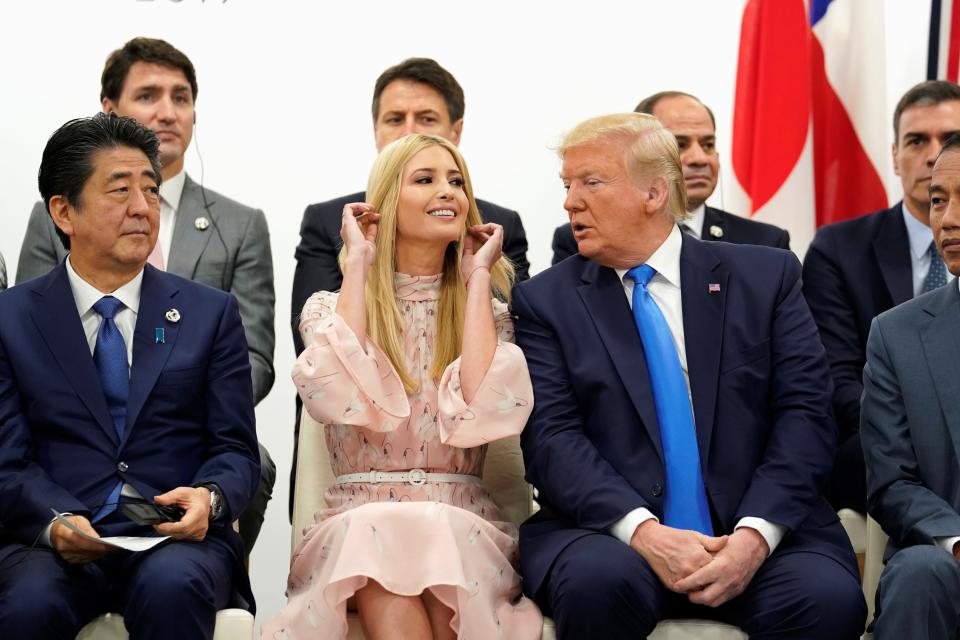
"The pair’s latest foray to the Group of 20 leading nations in Osaka, Japan and in the follow-on visit to the Republic of Korea and to the Demilitarized Zone, clearly show that Jared and Ivanka have crossed many lines when it comes to appropriate, ethical and effective stewardship of America’s national security interests," former senior State Department official Wendy Sherman wrote in a 2019 USA Today opinion piece, noting that financial disclosure forms showed the two earned "over $80 million through their private businesses" the year before during Trump's second year in office.
"Indeed, we are seeing the privatization and monetization of diplomacy," wrote Sherman, the Obama administration undersecretary of state for political affairs from 2011 to 2015. "From Jared's embrace of Saudi Arabia in the wake of the brutal murder of (U.S.-Saudi journalist) Jamal Khashoggi because, as the president has said himself, they buy a lot of weapons from the United States, to Ivanka continuing to win Chinese trademarks that pose conflicts of interest on policy and her own post-administration finances, everything seems to be about building platforms for their future business."
Senate Democrats, led by Finance Committee Chair Ron Wyden, launched an investigation into the foreign payments made to Kushner's firm earlier this month. House Democrats have been looking into both Trumps and Kushner since 2017.
And while the two say they have no plans to return to government service, Trump himself has done even more to blur the line between his private businesses and his public role on behalf of the American public.
'No new foreign deals ... whatsoever'
After winning the White House in November 2016, Trump was asked by many government watchdogs to divest from his businesses to avoid conflicts of interest. The president-elect rejected those calls, citing the exemption of the president and vice-president from the federal law prohibiting conflicts of interest for other federal officials.
“The law is totally on my side, meaning, the president can’t have a conflict of interest," Trump said.
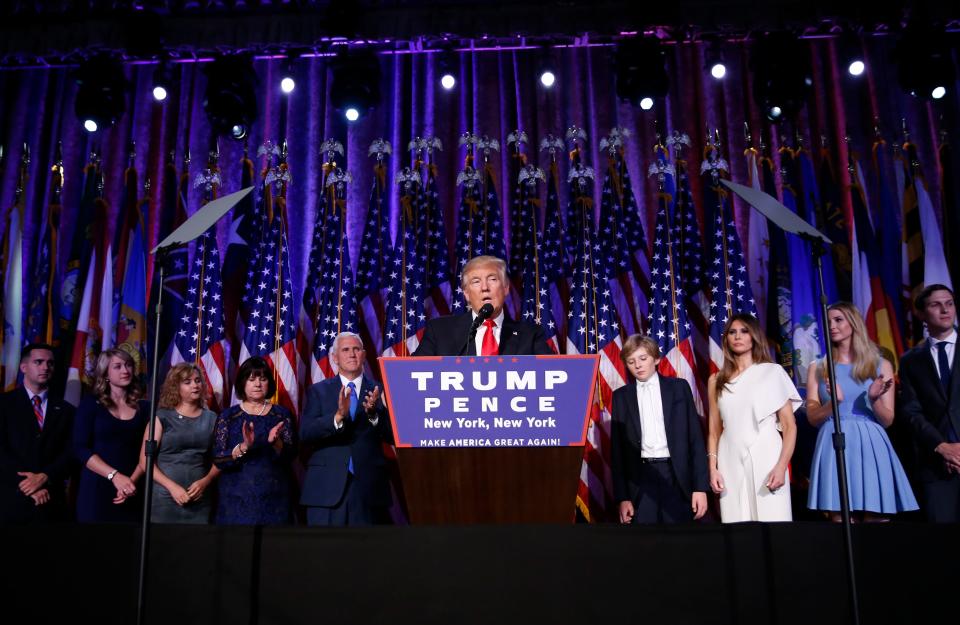
“I could actually run my business and run government at the same time," Trump contended at a Jan. 17, 2017 press conference. "I don’t like the way that looks, but I would be able to do that if I wanted to.”
The law doesn’t actually say the president can’t have a conflict of interest, but Congress does exempt the president and vice president from conflict-of-interest laws, in Title 18 Section 208 of the U.S. code.
Lawyer Sheri Dillon, who Trump brought to the 2017 press conference, said the incoming president had “voluntarily” directed her and her law firm “to design a structure for his business empire that will completely isolate him from the management of the company.”
As a result, she said, “No new foreign deals will be made whatsoever during the duration of President Trump’s presidency.”
Also, Trump would create a revocable trust and relinquish “leadership and management of the Trump Organization to his sons Don and Eric and a longtime Trump executive, Allen Weisselberg,” Dillon said.
Weisselberg, the Trump Organization's chief financial officer, later went to jail for committing tax fraud, for which two Trump companies were also convicted. He was locked up again for committing perjury during an investigation into alleged Trump Organization wrongdoing.
Trump 'White House for sale?'
The Oversight Committee Democrats' report from January is titled, “White House for Sale: How Princes, Prime Ministers, and Premiers Paid Off President Trump.”
"Despite the Constitution's requirement that a president disclose foreign emoluments and seek Congress's consent to keep them, it took Oversight Committee Democrats years of aggressive litigation against the former President to obtain the subset of documents from Mazars, Donald Trump's accounting firm," the report noted.
In January 2023, Oversight Committee Chair James Comer, R-Ky., released Mazars from having to continue complying with the committee's subpoena.
Even so, with data from just 20 countries and four of Trump's more than 500 businesses over two years, the committee found $7.8 million in payments, with the biggest spender being China.
“Former President Trump has legitimate businesses, but the Bidens do not,” Comer said in a statement responding to the report, before alleging that the Biden family had also profited from foreign governments via the consulting work of Hunter Biden, the president's son.
CREW sued Trump in 2017 over the emoluments issue, but the U.S. Supreme Court dismissed the case in 2021, saying the statute no longer applied since Trump was out of office. By February 2020, CREW’s tracking concluded Trump had “racked up 3,000 conflicts of interest,” including the 69 foreign trademarks to his businesses.
More recent debts, obligations – and financial disclosures
Trump's current financial and legal woes make him even more vulnerable to foreign influence, experts say.
A New York federal civil jury in January found Trump must pay columnist E. Jean Carroll $83.3 million for defaming her. In February, a New York judge ordered Trump and his company to pay $453.5 million for fraudulently over-valuing his real estate empire.
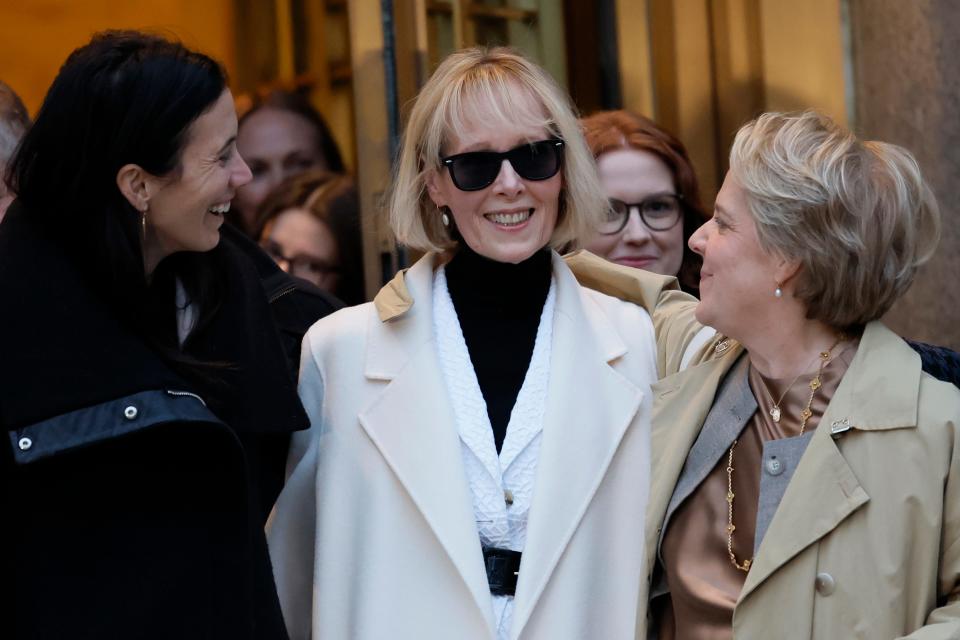
“Financial conflicts of interest in foreign countries would be an even greater risk for a second Trump presidency than in the first. This is because Trump is deeply indebted with civil fraud judgments and mounting legal bills in his criminal cases,” Painter, the Bush White House ethics lawyer, said.
In 2016, Painter, former White House ethics czar Norman Eisen and Harvard Law professor Laurence Tribe warned about how Trump’s business dealings with foreign governments would be prohibited because of concerns about foreign influence by those who wrote the U.S. Constitution.
Now, Painter tells USA TODAY, “Trump Organization financial dealings in foreign countries are as wide-reaching as they ever were, and most of these countries are not democracies. Some are not friendly to the United States.”
Trump's income from authoritarian regimes
Here are some of the potential foreign conflicts of interest for Trump in a second term, based on reports by Congress, non-profits including CREW and CAP, and USA TODAY interviews:
Saudi Arabia | China | India | Turkey | Philippines | Indonesia | Kuwait | United Arab Emirates | Qatar
Saudi Arabia
Trump family businesses have received significant revenues from Saudi Arabian sources, including $2 billion to Jared Kushner’s Affinity Partners investment fund, which gets 99% of its fund capital from non-U.S. sources. In the White House, Kushner worked closely with Saudi Arabia's Crown Prince Mohammed bin Salman, who has harshly repressed dissent among Saudis − even targeting those residing in the United States.
The Saudi government also spent lavishly at Trump properties, including an estimated 500 nights at Trump International Hotel in Washington, D.C.
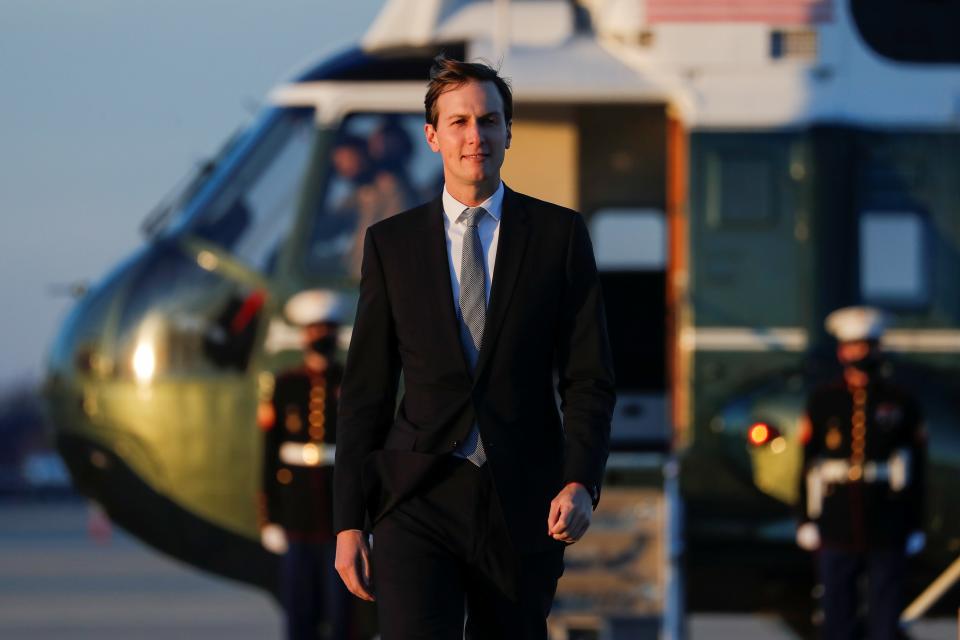
China
Before his election, Trump listed at least eight businesses in China in his 92-page financial disclosure form, and he had a "sprawling trademark portfolio that the government of the P.R.C. enlarged" during his four years in office, the House report said.
Ivanka Trump’s brand received numerous Chinese trademarks during Trump’s presidency too, raising conflict of interest concerns about her in getting Beijing's help protecting her brands of clothing, accessories and other products in China without competition from copycats. She sold the products worldwide before shutting down her business sometime in 2018, the person close to her said.
The Beijing government also was busy buying Trump properties during his term. And Chinese state-owned entities were, by far, the heaviest spenders at Trump hotels and other properties, paying $5.6 million in New York, Washington and Las Vegas.
India
During his term, India was − and likely remains − home to the largest number of Trump-owned business projects outside the U.S. including Trump Towers in Mumbai and Kolkata and other luxury real estate projects with a total estimated value of $1.5 billion, according to the Indian Express newspaper.
According to the Oversight Committee Democrats' report, Trump enjoyed a “uniquely warm relationship” with Indian Prime Minister Narendra Modi, a Hindu nationalist who has drawn international criticism for human rights violations and Islamophobia.
The Indian government spent at least $282,764 at Trump properties, including owning two units in Trump World Tower in New York “throughout the Trump presidency, as well as multiple stays at the Trump International Hotel in Washington, D.C.," by officials from the Indian Embassy there.
Turkey
Trump “entered the presidency with significant and lucrative existing business interests in Turkey,” the House report said. That included licensing fees for Trump Towers Istanbul and a longtime branding deal with one of Turkey’s most politically influential families, according to CAP. The Ankara government also “repeatedly patronized Trump-owned properties” in the United States.
In 2019, Trump said it was "an honor" to host Turkey's authoritarian President Recep Tayyip Erdogan in the Oval Office, despite bipartisan congressional opposition to the visit due to a Turkish assault on the Kurds, a U.S.-allied group. Trump declared himself a "big fan" of the strongman. Trump also withdrew U.S. troops from Syria, allowing Turkey to invade, leading to the resignation of Trump's Secretary of Defense James Mattis.
Philippines
Trump received “millions of dollars” from his financial stake in a Trump-branded apartment complex in Manila while he was president, with his business partner later appointed as the Philippine government’s special envoy to the U.S.
In June 2018, while Philippines President Rodrigo Duterte was seeking a free-trade deal with the United States, the country’s embassy paid $74,810 to hold its National Day reception at Trump’s Washington hotel. Trump “repeatedly praised Duterte even as the authoritarian ruler was accused of orchestrating the extrajudicial killings of thousands” of Filipino citizens, according to the Oversight Committee Democrats' report.
Indonesia
Of the $160 million Trump earned while president from his businesses in foreign countries with interests in U.S. foreign policy, $14 million of it came from his business interests in Indonesia, according to a CREW analysis of his tax returns.
In June 2015, a week after announcing his presidential bid, Trump created corporations to manage two Indonesian projects in Bali and Lido. By the next year he reported receiving as much as $10.16 million in royalties and fees and owning or managing at least eight hotel, golf and technical services firms there. By 2019, Trump resort business partner and Indonesian conglomerate MNC boasted on its website that an “aggressive global expansion” of the “Trump International Portfolio” was “underway,” with “numerous projects in the pipeline.”
Kuwait
Just days after Trump won the 2016 election, Kuwait abruptly switched the venue for its “Embassy of Kuwait National Day” event to the Trump International Hotel in Washington and paid $82,713 including $12,000 for a “Sushi Station.” It racked up other charges at that hotel and other Trump properties, including as much as $152,664 for a unit it owned at Trump World Tower.
United Arab Emirates
Trump maintained his significant business interests in UAE while in office, including the $6 billion Trump-branded International Golf Club Dubai and Trump World Golf Club Dubai, which opened in 2017 with both Trump sons in attendance.
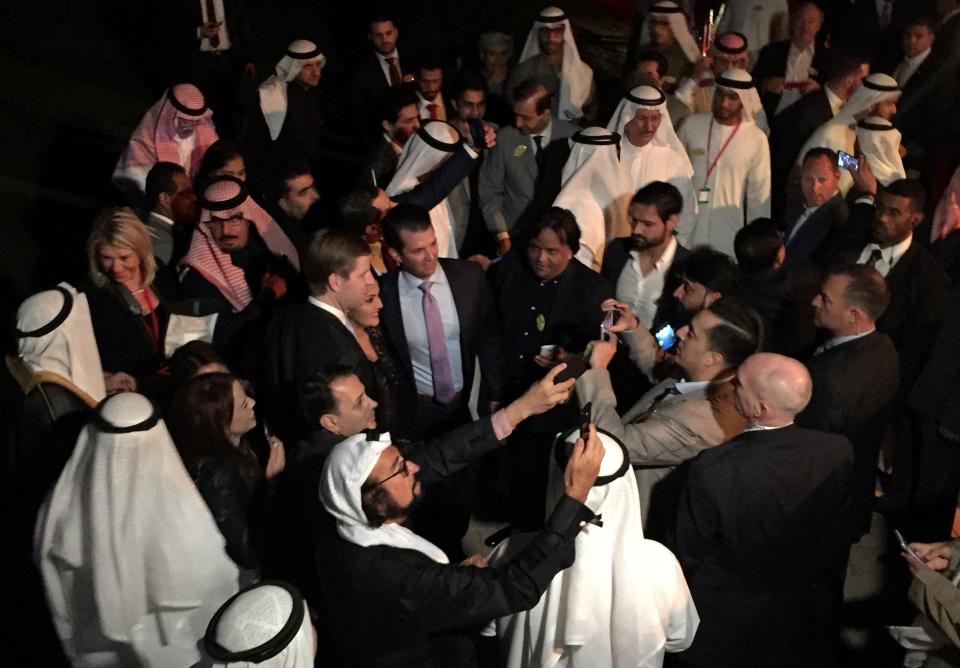
Beginning in 2017, the UAE government spent tens of thousands of dollars at Trump’s Washington hotel. In 2017, Trump boasted about how he’d just turned down another deal worth $2 billion from his “very amazing” golf club partner, Hussain Sajwani of DAMAC, to avoid the appearance of a conflict even though he “didn’t have to turn it down, because as you know, I have a no-conflict situation because I’m president.”
Qatar
Qatar paid $465,744 to the Trump World Tower for properties it owned during Trump’s term in office and also “spent heavily” at other Trump-owned hotels and properties, notably during periods of diplomatic tension in the Gulf region. Qatar, like other countries where Trump had business including Saudi Arabia, Kuwait and the UAE, was exempt from Trump’s ban on immigration from many Muslim-majority nations.
This article originally appeared on USA TODAY: Trump took money from foreign governments. Will he do it again?

